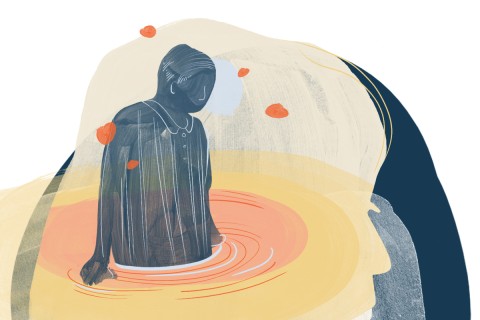Marlowe’s ghost among American atheists
A 2006 study in American Sociological Review shows that, while both divisions among American Christians and negative perceptions between people of different faiths are eroding, there is still one group that Americans don’t trust: those who choose to remain outside of communities of belief. Further research shows that atheists are perceived about as favorably as Muslims. Not believing in God constitutes a social mōs on par with one of the most maligned religious groups in the current American zeitgeist. (At least one op-ed has called for a political alliance between Muslims and atheists on the grounds that much of the current vitriol in American politics is aimed at these two groups.)
The most fascinating question here falls outside of quantitative analysis: what does an atheist look like? Atheists are not necessarily immediately identifiable as such. The perceptions, stereotypes, and identifications of many social demographics are characterized by performativity. But how does one perform atheism?
It is, perhaps, this lack of performativity that results in such distrust. Atheism’s perceived danger to the American socio-cultural fabric lies in the inability to point atheists out. In the American imagination, this makes them very good at functioning as spies.
One of history's larger icons of atheism still manages to garner questions regarding his personal religious beliefs. Christopher Marlowe was arguably the most promising poet and playwright of late 16th-century England. Historians continue to question his fervor for systems of belief outside those of the English Protestant church, along with questioning his theism in general. Even his contemporaries speak to the dangers of his writings, musings, and personal activities.
Furthermore, Marlowe has long been identified as a spy of the English state during that tumultuous period of religious history. Extant records of the Cambridge University student rolls show periods of long absences, and even a notation that one absence was due to his sensitive work for the Crown. At the time, much of English Protestantism was in the crucible of a systemization that would significantly influence American religious structures and beliefs. But Marlowe stands as an iconoclast of both his day and our current religious epoch.
Framing Marlowe’s atheism—or at least, the narrative constructed about his atheism—within his own context demonstrates that little has changed. Like Marlowe, atheists today often have their performativity constructed for them by those who distrust them the most. During his life and continuing after his death, those who knew Marlowe characterized him primarily by his rhetoric; he was most identifiable as an atheist when conversing, due to his insistence that others be [de]converted to his cause. Historiographically, Marlowe’s espionage has been woven together with his atheism. The danger of the atheist lies not in their unbelief but in their hiddenness, their capacity for deception through clandestine means.
As a pillar of the historical atheist community, Marlowe stands tall: he courageously resisted the conflation of religion and nationalism. But few others in history were so clearly singled out for their non-theism, not until Friedrich Nietzsche.
Today, the number of atheists in this country continues to grow. Individuals such as Stephen Hawking, Daniel Dennett, and Jennifer Michael Hecht are finding their rhetoric more widely accepted within the public sphere. But with this growth, the performativity of non-theistic rhetoric is socially stratified: it indicates the academic liberal elite. Consequently, the counter-performance to atheists’ increasing social visibility is found among some religious conservatives: the performance of ignorance.
Our weekly feature Then and Now harnesses the expertise of American religious historians who care about the cities of God and the cities of humans. It's published in partnership with the Kripke Center of Creighton University and edited by Edward Carson and Beth Shalom Hessel.



